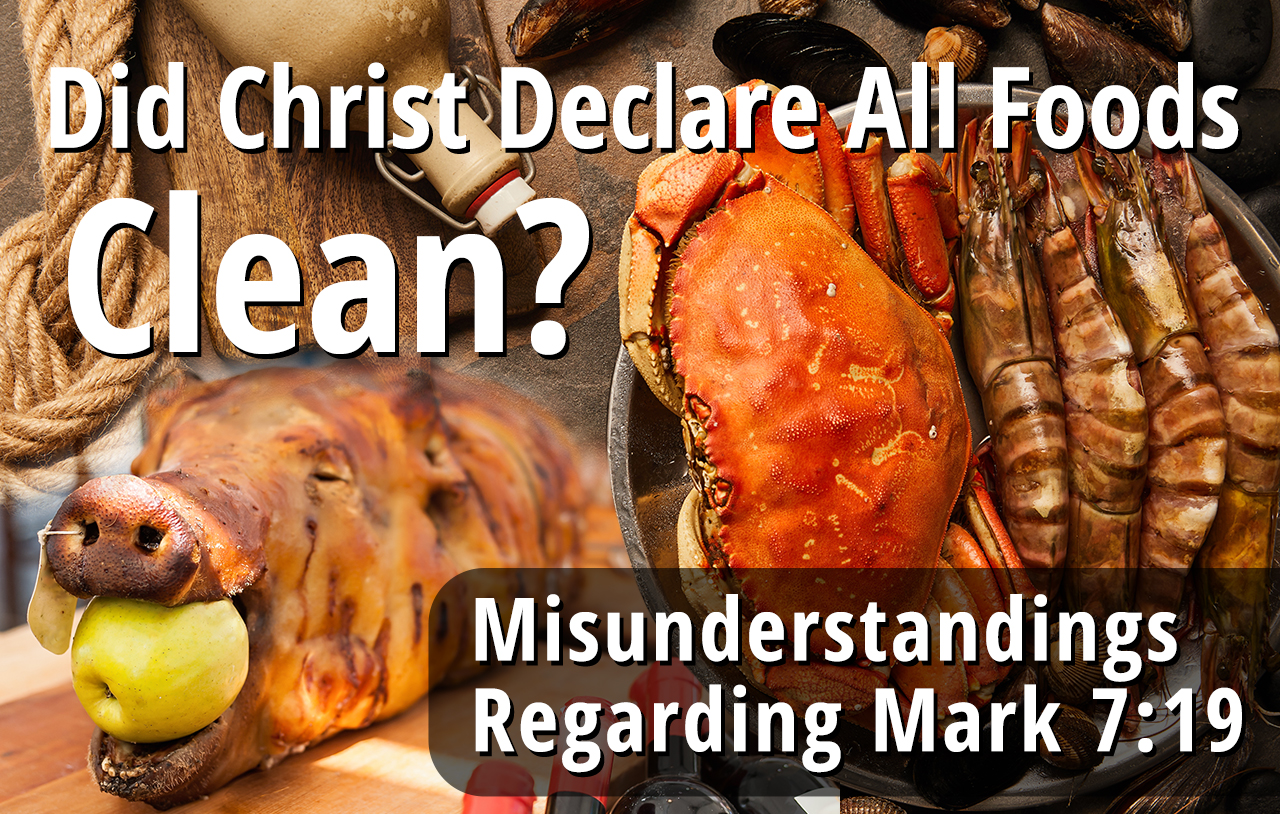Did Christ declare all foods clean? Misunderstandings regarding Mark 7:19
|
This is a non-WLC article. When using resources from outside authors, we only publish the content that is 100% in harmony with the Bible and WLC current biblical beliefs. So such articles can be treated as if coming directly from WLC. We have been greatly blessed by the ministry of many servants of Yahuwah. But we do not advise our members to explore other works by these authors. Such works, we have excluded from publications because they contain errors. Sadly, we have yet to find a ministry that is error-free. If you are shocked by some non-WLC published content [articles/episodes], keep in mind Proverbs 4:18. Our understanding of His truth is evolving, as more light is shed on our pathway. We cherish truth more than life, and seek it wherever it may be found. |

Living in an island nation, I was brought up, as any other child in our country, to love our seafood. Prawn, Crab, and Cuttlefish were the norm in our diet. A meal without seafood at least once a week was unthinkable. With our country's Dutch, Portuguese & English influences, we also came to love Pork. I was a fan of Bacon and had prawn & cuttlefish regularly. I couldn’t think of a life without Seafood in my diet. Growing up, we were taught that Yahuwah is now more loving than in the Old Testament. He was portrayed as the “God of Love and Grace” instead of the Old Testament version, the “God who was a consuming fire.”
This worked out fine with our lives, society, and diet because most of what we ate was what Yahuwah had told His People not to eat in the Old Testament (i.e., pork and fish without scales and fins, which included prawn, crab, cuttlefish, shellfish, lobster, etc.).
Something dawned on me when I first started looking at the Scriptures as a whole, where no verse can contradict or annul another. Does this mean we still have to eat and not eat according to what Yahuwah said in Leviticus 11? But what about Paul’s writings? He seems to say that we can eat anything, but don’t the Gospels even show Messiah Yahushua declaring all foods clean?
Before I addressed Paul, I needed to see whether our Savior (whom we are meant to follow) did change the Food Laws given by Yahuwah. The only place I could find Him saying something close to “We can eat anything we want” was in Mark 7.
Mark 7:19 was of particular interest, so I read through a couple of English Translations of the Bible. Most of the versions said that “Yahushua declared all foods clean.” Interestingly, the KJV did not contain this part, while all other versions had it in brackets.
- New International Version “For it doesn’t go into their heart but into their stomach, and then out of the body.” (In saying this, Yahushua declared all foods clean.)
- English Standard Version “since it enters not his heart but his stomach, and is expelled?” (Thus he declared all foods clean.)
- New American Standard Bible “because it does not go into his heart, but into his stomach, and is eliminated?” (Thus He declared all foods clean.)
- King James Version “Because it entereth not into his heart, but into the belly, and goeth out into the draught, purging all meats?”
Why didn’t the KJV, one of the earliest translations into English done in 1611, not contain this portion? And why did the rest of the versions carry it within brackets? I found an interesting piece of information as I dug into the issue.
The Original Greek Manuscripts do not carry “In saying this, Yahushua declared” in Mark 7:19.
|
The Original Greek Manuscripts do not carry “In saying this, Yahushua declared” in Mark 7:19.
Some of the translators later added this to give this verse more clarity. This was the reason why the KJV Bible did not include this part. Since this was cleared out, I now had to make sure whether the decision by the Translators to add “(In saying this, Yahushua declared all foods clean)” was valid. Whether Yahushua was clearly stating that the Food Laws were no more. Looking at the context of the 7th Chapter of Mark leading up to verse 19 was essential to making this decision. Let us study Mark 7, from verse 1, and work our way down to the verses in question.
Mark 7:1-21 – Is it about eating any food or eating food without the tradition of washing the hands?
Reading Mark 7:1-4, I recognized that the story began with the Pharisees accusing some of Yahushua’s disciples of not washing their hands before eating bread. And Mark went on to note how the Pharisees and the Jews would not eat without washing their hands according to the “Tradition of the Elders.” They don’t eat without washing after coming from the marketplace and have many traditions like washing cups, pots, brazen vessels, and tables.
Some would associate the Pharisees with the Old Testament and conclude that these washings were from the Old Testament Law of Yahuwah. But, praise Yahuwah, I had been privileged to learn about the Pharisees and how they had their Law and teaching in addition to Yahuwah’s Law. This made all the difference, as I understood what Mark meant by “Tradition of the Elders” in verse 3.
In verse 5, the Pharisees ask Yahushua why His disciples don’t walk according to the “Tradition of the Elders,” eating with unwashed hands.
Yahushua addresses these in the following verses: not holding to the Tradition of the Elders and eating with unwashed hands.
He starts by quoting Isaiah 29:13, showing their hypocrisy, saying that they honor Yahuwah with their mouth, but their hearts are far from Him and that in vain they worship Him, teaching “Commandments of Men” as “Doctrine.”
|
In verse 6&7, He starts by quoting Isaiah 29:13, showing their hypocrisy, saying that they honor Yahuwah with their mouth, but their hearts are far from Him and that in vain they worship Him, teaching “Commandments of Men” as “Doctrine.”
In verses 8-13, he further establishes and clarifies their mistake, showing that they are laying aside Yahuwah’s Commandments and holding onto the Traditions of Men, which include washing Cups and pots and other things. He says that they reject Yahuwah’s Commandments so that they can keep their Traditions and that they make Yahuwah’s Word of no effect by Their Traditions. Observe how Yahushua points out the difference between Yahuwah’s Commandments and Traditions of Men.
What is the context so far? Is it Food? Or are they man-made traditions? Isn’t the whole conversation revolving around eating food with unwashed hands, which was the tradition in focus? Let us read on.
In Verses 14 and 15, He said that nothing that comes into a person from the outside can make him unclean. It is what comes out of a person that makes a person unclean. What is Yahushua saying if and when we take it in context? Is He saying that we can now eat whatever we want?
What Yahushua said was not a statement but a Parable. In Verse 17, the disciples ask what He meant by the Parable.
Now, we come to the verses in question. Yahushua answers the disciples in verses 18-23, saying that whatever enters into man cannot make him unclean, but only through sin that proceeds from the inside of man. He says that man is defiled by the sin inside.
But is He in the same go, saying that Yahuwah’s Food Laws are of no use because whatever we eat is purged out of the stomach? Is the same Yahushua that called the Pharisees hypocrites for making Yahuwah’s Law void, saying that Yahuwah’s Food Laws are now void? Before we decide on this, I would like to focus your attention on Matthew 15. In this chapter, Matthew is recording the same story in Mark 7. (I will not go into discussing the whole chapter from the beginning, though reading it for yourself will show that it is identical).
Let us read from Matthew 15:15. Just like in Mark, the disciples, Peter (as Matthew records), ask Yahushua to explain the parable to them. Yahushua says the same thing: “Whatever enters into man cannot make him unclean, but only through sin that proceeds from the inside of man.”
Yahushua’s whole argument was that “a person does not become unclean by eating with unwashed hands, but by the sin that comes out of the same person.
|
Matthew 15:20 is the Key. Yahushua then explains what He was talking about the whole time. He says, “These are what defile a person. But to eat with unwashed hands does not defile anyone.” Doesn’t this single verse explain everything? Whoever uses Mark 7:18,19 to say that Yahushua gave us the freedom to eat whatever we like will have a hard time explaining Mat 15:20. Yahushua’s whole argument was that “a person does not become unclean by eating with unwashed hands, but by the sin that comes out of the same person.
The fact is that this whole conversation revolved around “eating with unwashed hands.” Mark 7 and Matthew 15 talk about the same instance, and Matthew records Yahushua’s words regarding the issue of “Eating with unwashed hands.” There is no mention of Yahuwah’s food Laws in these chapters, and no translator can add phrases such as “(In saying this, Yahushua declared all foods clean)” with or without a proper understanding of the context.
This is a non-WLC article. Source: https://biblethingsinbibleways.wordpress.com/2013/05/12/did-christ-declare-all-foods-clean-misunderstandings-regarding-mark-719/
We have taken out from the original article all pagan names and titles of the Father and Son, and have replaced them with the original given names. Furthermore, we have restored in the Scriptures quoted the names of the Father and Son, as they were originally written by the inspired authors of the Bible. -WLC Team








